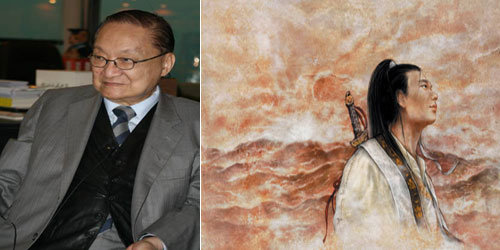Interview with Chinese Novelist Jin Yong
Interview with Chinese Novelist Jin Yong
Posted November. 03, 2007 09:09,

Chinese Novelist Jin Yong (Louis Cha, 84) is known among Koreans as Kim Yong. His most popular books are parts of a trilogy titled, The Legend of the Eagle Heroes, which was introduced in Korea under the title of The Doors of Heroes in 1986 and generated many fans in Korea.
Twenty years after its publication, an Internet community for those who like the books, Gwakjeonggwa and Yanggwa, has more than 16,000 members.
Another book of Jin Yongs entitled Heaven Sword and Dragon Sabre is the final part of the trilogy entitled The Legend of the Eagle Heroes after the first part that came out in 2003 entitled The Eagle-Shooting Heroes and the second part entitled The Return of the Eagle Heroes came out in 2005. The first edition of Heaven Sword and Dragon Sabre came out in 1961, but the author published a modified version before 2004. The one that recently published in Korea is the third version.
This reporter met Jin Yong at the office of the publisher Ming Pao. He was looking very fiery and healthy. He said, I visited Korea last October but I couldnt this year because I was finishing my doctoral thesis in history at the University of Cambridge.
Q: Even though you have been writing only martial arts and chivalry, novels, you have tried to talk about deep thoughts and universal concerns of people.
A: Ive also written Sanmungi, which is not about martial arts. Ive been more interested in martial arts novels since I was little and Ive tried to add a touch of art to martial arts novels, which were considered substandard. This changed traditional views held by critics and the public.
Q: Your works, however, are considered lowbrow novels, not pure literature.
A: I dont agree with such a double standard. There were many debates about this issue, but nowadays people think more about integrating these two. Ive experienced the strong Korean Wave flowing in Asia by watching Daejanggeum; Winter Sonata; Sympathy for Lady Vengeance; Milyang; and Christmas in August. They were both artistic but interesting, too, and this is what people all over the world are looking for.
Q: One of the characters of Heaven Sword and Dragon Sabre, Cheung Mo-kei is indecisive. Other male characters in your novels all have their own shortfalls, while female characters are all bright and attractive.
A: Everyone is born different, and so are the characters in the book. I tried to depict a hero who is humane. There are three reasons why female characters are smart in my books. First, they are born smarter than men. Second, that makes writing more fun and easier. Third, thats what readers want. In Koreas classic Chunhyangjeon, Chunhyang is wiser than her male counterpart Lee Mong-ryong.
Q: Your story plots are fairly complicated. What is your writing style?
A: Before writing anything, I study Chinese history a lot. I reference traditional books and documents. When I outline a story, the story flows naturally. I prefer the writing style of Lee Baek, who dashes off with one stroke of brush, to Du Fu, who writes densely.
Q: Your novel Demi Gods and Semi Devils has been recently included in textbooks of middle and high schools in China.
A: My books were banned in China and Taiwan because the government mistakenly thought martial arts novels did no good for the public. The ban was lifted after my books gained popularity in other countries. They were published in the textbook, I think, because of my writing style. I try to use traditional Chinese grammar rather than foreign styles.
Q: Any words to Korean readers?
A: Ive heard that a few copies of my book are in North Korea. Ive received a fan letter from a North Korean soldier, too. I hope that exchanges of books will aid reunification of two Koreas. South Korea is seeing its status being enhanced. I hope Koreans will be able to preserve attractive attributes of their culture.
ray@donga.com







